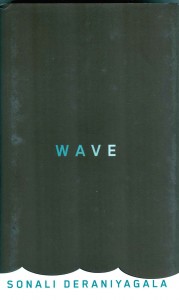 Sri Lankan Author Sonali Deraniyagala lost her husband, two sons, and mother and father in the Dec. 26, 2004 tsunami, which killed an estimated 230,000 people. Her story is told in Wave (2013, ISBN 978-0-307-96269-0). It’s a story of tragedy, a personal loss reiterated, emphasized, and relentlessly pounded into the reader on virtually every page. But it’s neither a particularly insightful nor compelling book, for readers looking for answers for dealing with personal tragedies.
Sri Lankan Author Sonali Deraniyagala lost her husband, two sons, and mother and father in the Dec. 26, 2004 tsunami, which killed an estimated 230,000 people. Her story is told in Wave (2013, ISBN 978-0-307-96269-0). It’s a story of tragedy, a personal loss reiterated, emphasized, and relentlessly pounded into the reader on virtually every page. But it’s neither a particularly insightful nor compelling book, for readers looking for answers for dealing with personal tragedies.
The reviewer wants to be on her side. After all, she’s lost everything but her own life. But after seven years and 228 pages, she just can’t get on with it. She’s barraged by memories that don’t stop, challenging her every move, enveloping thoughts, weakening relationships. The caterwauling never ceases. Somewhat not surprisingly, her therapist is the first person she thanks in her acknowledgements.
People who’ve deal with their own personal tragedies will find no solutions here, and that’s the most frustrating part of the book. The author’s not the only one with a loss. We here at WoWasis are reminded of the days we spent in an oncology clinic, in which every attendee was having chemotherapeutic poisons flushed into his or her bloodstream. No one was having fun, but two schools emerged. One philosophy celebrated the joy of having one more day on the earth, where the sun still shown, flowers still bloomed, conversations with friends and loved ones still occurred, a baseball game somewhere was still being played. The contrarian philosophy was essentially all about “Why Me?” What did I do to deserve this? Life was so perfect before, now it’s been taken away. A black curtain had descended, seemingly blocking out the simplest joys. In talking with these patients, the conversation was all about death, the events that would lead up to it, the pain and grief surrounding it, the terrible frustration in having life end before it was perceived that it should.
Deraniyagala’s book is all about grief as well. Relentless, oppressive, and obsessive grief, offering respite for neither her nor her readers. OK, we wanted to shout to the author. We understand your pain. But now what are you gonna do about it? And the only answer we seem to get is her verbal facility in compounding grief with more grief.
The best part of the book is the beginning, in which she describes the maelstrom of the tsunami and the several days thereafter, in which she, who nearly lost her own life, finds proof of the death of her family. It’s a harrowing first person account. Beyond that, we were seeking character development, although this is no novel. But there wasn’t any. And we are left with a lonely grieving woman, crying into the wilderness.
We predict there won’t be many poor reviews of this book. Perhaps this will be the only one. Writing a negative review of a book written by someone who’s experienced this degree of personal tragedy seems a bit like running over an injured puppy to put it out of its misery. It’s retailing for $14 USD. For readers looking for a 228 page cry, here’s the place to be. Buy it here at the WoWasis eStore.
Leave a Reply